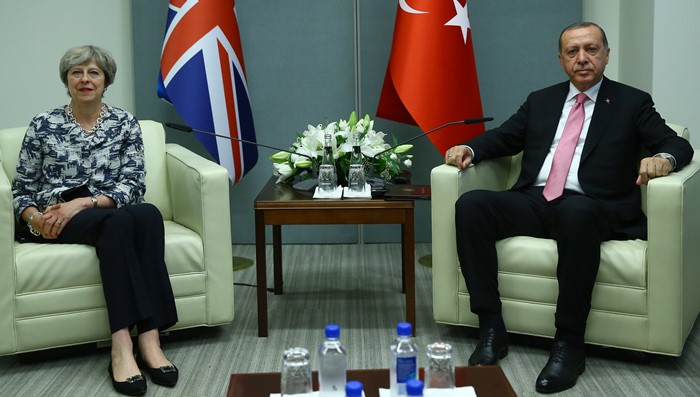David Mepham, the UK director of Human Rights Watch (HRW), has called on Prime Minister Theresa May to use the visit of Turkish President Recep Tayyip Erdoğan to London next week to persuade Erdoğan to end a brutal crackdown on opponents and critics.
In an article on the HRW website, Mepham said: “Despite the sharp deterioration in human rights under his leadership, Turkey’s President Recep Tayyip Erdoğan, is being accorded a state visit to Britain next week, including a meeting with Prime Minister Theresa May and with the Queen. Undoubtedly, May would prefer the discussion focus on investment, trade, and Syria, but the scale of repression underway in Turkey makes it impossible to ignore. She should use the moment to urge an end to the Turkish government’s brutal crackdown on opponents and critics.”
English PEN and other press freedom organizations have invited the public to join the “Free Turkey Media” protest to be held on May 15 outside Downing Street in London, where Erdoğan will be meeting with May.
Recalling that “the visit comes ahead of presidential and parliamentary elections on June 24 in which Erdoğan seeks to renew his mandate with greatly enhanced powers” and “the elections themselves won’t be credible the UN’s human rights chief has said, unless the 22 month state of emergency is lifted,” Mepham said:
“Media freedom is being decimated: Journalists and critics on social media are being prosecuted and more than 170 reporters, writers, and media workers are in jail, most of them awaiting verdicts. The crackdown, along with takeovers and closures of media outlets, means that most of the media – especially television – is now a propaganda machine for Erdoğan’s ruling AKP party and the government.”
HRW’s UK director also underlined that opposition parties face big obstacles in contesting the election, disadvantaged in their election campaigning: “The country’s second opposition party in parliament, the left-leaning, pro-Kurdish Peoples’ Democratic Party (HDP) has been hardest hit. Nine of its parliamentarians are in prison and eleven have been stripped of their parliamentary seats in politically motivated cases. An MP from the main opposition Republican People’s Party (CHP) was convicted and jailed in February in a politically motivated case. The former HDP leader Selahattin Demirtaş is standing as a presidential candidate from his prison cell.”
“Civil society and human rights defenders face enormous pressure with countless more “terrorism” trials and convictions, defenders like Amnesty International Turkey’s chair Taner Kılıç behind bars already for nearly a year, and some women’s rights associations arbitrarily closed down by the government,” added Mepham.
“It’s time for May to show some backbone and press Erdogan to end these abuses. May should call publicly for the release of all those Turkish journalists, politicians, and human rights defenders who have been unjustly imprisoned, and make clear Britain will not licence further military equipment for Turkey that might be used to violate human rights.”
The European Commission (EC) on April 17 called on the Turkish government to “lift the state of emergency without delay,” saying that widespread dismissals, arrests and detentions continue to raise serious concerns.
The Turkish government declared the state of emergency five days after a failed coup attempt on July 15, 2016 and is preparing to extend it for a seventh time. Accusing the faith-based Gülen movement of being behind the coup attempt, President Erdoğan and his ruling Justice and Development Party (AKP) launched an all-out witch hunt targeting people allegedly linked with the movement.
Citing “the broad scale and collective nature, and the disproportionality of measures,” the EC in its “2018 Report on Turkey” said: “Since the introduction of the state of emergency, over 150 000 people were taken into custody, 78 000 were arrested and over 110 000 civil servants were dismissed whilst, according to the authorities, some 40 000 were reinstated of which some 3 600 by decree.”


